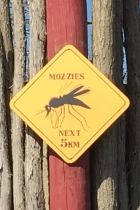Zika Virus - Advice for Crew

Whatever your reasons for travelling near or far, it’s important to be aware of the risks around the Zika virus and to know how to protect yourself from becoming infected.
Until now, for those of us in Europe at least, the risk of contracting the Zika virus has felt rather remote, but last week it was reported that the Zika virus had reached Scotland in the UK. And with a view to our fellow yachties Stateside, over 1,800 Zika infections have now been reported in the US, including four people in Miami last week, the first cases not associated with travel outside the mainland.
Meanwhile, a truly international gathering is underway at the Olympics in Rio, Brazil, where cases are already prevalent. So what’s the latest travel advice and what steps can we take to avoid infection?
Zika Virus: History
Zika virus is a mosquito-borne virus first identified in 1947 in monkeys in Uganda. It was later identified in humans in 1952 in Uganda and Tanzania and the disease has since been recorded in Africa, the Americas, Asia and the Pacific, typically involving mild illness.
The first large outbreak was recorded in 2007 on the island of Yap, part of the Federated States of Micronesia. In July 2015, Brazil reported an association between Zika infection and Guillain-Barré syndrome, followed in October by reports of an association between Zika and microcephaly (unusually small heads in newborns with associated neurological defects).
There are a number of precautions you can take, and the best and most up to date advice comes from the World Health Organization (WHO).

Zika Virus: Transmisson, Symptoms & Prevention
The Zika virus is mostly transmitted by infected mosquitoes, but it can also be spread by sexual intercourse, blood transfusions and from a pregnant mother to her unborn child.
Many people infected with the Zika virus show mild symptoms or none at all, making it hard to detect without a blood test. Symptoms usually include mild fever, skin rashes, conjunctivitis, muscle and joint pain, malaise and headache. These symptoms usually persist for two days to a week. Complications of the Zika virus can include brain defects and neurological disorders in unborn children.
Prevention of tranmission by mosquitos involves the use of officially recommended repellants and mosquiti nets, and avoidance of those regions known to be affected. The use of condoms is also recommended for anyone at risk of sexual transmisson, especially pregnant women. For more detaled advice click here.

Travel Advice
At a local level, the UK National Health Service advises that for most people Zika infecton is a relatively mild condition and not harmful, and similar advice has been issued by Health Protection Scotland. The Florida Department of Health has also issued specific advice for those who may be affected by the recent outbreak in a neighborhood in Miami which you can see here.
More generally, the US Centers for Disease Control (US-CDC) recommends that you check their website for the latest information and advice before travelling.
The most up to date global information can be found on the WHO website which provides incidence maps and regular Zika Virus Situation Reports.
WHO's latest update published on 4 August summarizes:
-
68 countries and territories have reported evidence of Zika virus since 2007.
-
Of these, 65 report cases since 2015, 51 being a first outbreak.
-
The United States of America reported mosquito-borne Zika virus transmission for the first time on 29 July 2016.
-
Since February 2016, 11 countries have reported evidence of person-to-person transmission of Zika virus, probably via a sexual route.
-
14 countries or territories have reported microcephaly and other central nervous system (CNS) malformations potentially associated with Zika virus infection or suggestive of congenital infection.
-
Three of the 14 total countries reported microcephaly cases born from mothers in countries with no endemic Zika virus transmission, but who had recently travelled to affected countries in the WHO Region of the Americas.
-
No further countries or territories have reported microcephaly in the last week.
-
The US-CDC reported 13 live-born infants with birth defects and six pregnancy losses with birth defects showing evidence of Zika virus infection.
Related Article:
How an Obscure Disease Became a Global Health Emergency
*Image credits: Nuzree via Pixabay CCO; Frankleleaon via Flikr CC By 2.0 (cropped)

Post your comment
You cannot post comments until you have logged in.
Login to post a commentComments
No one has commented on this page yet.
RSS feed for comments on this page | RSS feed for all comments